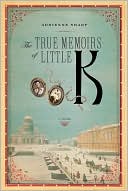The Scarlet Contessa of the Italian Renaissance
What Philippa Gregory has done for Tudor England, Jeanne Kalogridis does for Renaissance Italy. Her latest irresistible historical novel is about a countess whose passion and willfulness knew no bounds—Caterina Sforza\ Daughter of the Duke of Milan and wife of the conniving Count Girolamo Riario, Caterina Sforza was the bravest warrior Renaissance Italy ever knew. She ruled her own lands, fought her own battles, and openly took lovers whenever she pleased.\ Her remarkable tale is told by her...
Search in google:
What Philippa Gregory has done for Tudor England, Jeanne Kalogridis does for Renaissance Italy. Her latest irresistible historical novel is about a countess whose passion and willfulness knew no bounds—Caterina Sforza Daughter of the Duke of Milan and wife of the conniving Count Girolamo Riario, Caterina Sforza was the bravest warrior Renaissance Italy ever knew. She ruled her own lands, fought her own battles, and openly took lovers whenever she pleased. Her remarkable tale is told by her lady-in-waiting, Dea, a woman knowledgeable in reading the “triumph cards,” the predecessor of modern-day Tarot. As Dea tries to unravel the truth about her husband’s murder, Caterina single-handedly holds off invaders who would steal her title and lands. However, Dea’s reading of the cards reveals that Caterina cannot withstand a third and final invader—none other than Cesare Borgia, son of the corrupt Pope Alexander VI, who has an old score to settle with Caterina. Trapped inside the Fortress at Ravaldino as Borgia’s cannons pound the walls, Dea reviews Caterina’s scandalous past and struggles to understand their joint destiny, while Caterina valiantly tries to fight off Borgia’s unconquerable army.Publishers WeeklyThis vividly rendered historical takes readers to tempestuous Renaissance Italy, where city-states and noble families battle for supremacy over Italy and, through the papacy, the world. Caterina Sforza comes into power by marrying the illegitimate son of Pope Sixtus, and while her husband is slothful and suspicious, Caterina is clever and ambitious, allying herself with powerful men to ensure her family's success throughout tumultuous times. Always by her side is her confidante, Dea, who has a gift for reading tarot cards, and, as our narrator, relates Caterina's struggles and schemes against a lush backdrop swarming with the most powerful families of the day--the Borgias and the Medicis, though these players, unfortunately, feel mostly like window dressing. Seeing the world through Dea's eyes only makes the reader yearn more to know what Caterina, who remains too much a mystery, is thinking. There's plenty of intrigue and conspiracy in the lusty plot, but the characters don't quite sing. (July)
\ One At dusk the screams came—outraged, feminine, shrill. We would never have marked them had it not been for the smoke and the singers’ sudden silence. I heard them eight days before Christmas as I stood in the loggia, gasping in stinging cold air from the open window, brusquely unshuttered by a quick-thinking servant.\ A moment earlier, I had been sitting in front of the snapping hearth in the duchess’s quarters while one of her chambermaids roasted pignoli on a wood-handled iron peel—treats for the ducal heir, seven-year-old Gian Galeazzo Sforza, who stared blankly into the flames while his nurse brushed out the straw-colored curls covering his frail shoulders. Beside him sat his six-year-old brother, Ermes—thick-limbed and thick-waisted, slow to move or think—with a straight cap of dull red hair. To their left sat their mother, Duchess Bona, a sheer white veil wrapped about her coiled, muddy braids, her lips pursed as she squinted down at the needle and silk in her plump hands. She was twenty-seven and matronly; God had dealt her a stout frame, squat limbs, and a short, thick neck that dwarfed her broad face. Though her features were not unpleasant—her nose was short and round, her skin powder-soft and fine, her teeth small and fairly even—she had a low forehead with thick, overwhelming eyebrows. Her profile was flat, her eyes wide set, her small chin lost in folds of fat, most of it acquired after the birth of her first child; yet at the court of Duke Galeazzo, to my thinking, there was no lovelier soul.\ To Bona’s left sat the duke’s two natural daughters, results of his dalliance with a courtier’s wife. The elder, Caterina, was, at thirteen, an example of physical perfection, with a lithe body that promised full breasts, clear skin, and a straight, well-proportioned nose, though her lips were rather thin. Two attributes propelled her past mere attractiveness into true beauty: full, loose curls of a gold so pale and bright it glittered in the sun, and eyes of a blue so intense that many who met her for the first time let go an involuntary gasp. The effect was enhanced by the natural confidence of her gaze. That afternoon, however, her gaze was sullen, for she had no patience with the needle and she hated sitting still; she paused often in her embroidery to glare at the fire and emit sighs of vexation. Had it been summer, she would have ignored the duchess’s insistence on a sewing lesson and joined her father on the hunt, or gone riding with her brothers, or chased them across the sprawling courtyard. No matter that such activities were exceedingly inappropriate for a young woman, already betrothed and certain to wed within three years. Caterina had no fear of the duchess’s wrath, not just because Bona was disinclined to anger, but also because her father the duke favored her and rarely allowed her to be punished.\ The same could not be said of her nine-year-old sister, Chiara, a rail-thin, timid mouse with bulging brown eyes and a narrow, sharp-featured face. For all the attention the duke showed Caterina, Chiara—a slow-witted, obedient girl—received only his unwarranted abuse; she rarely met another’s gaze and kept close to Bona’s side. For Bona’s heart was so great that she treated all the duke’s children equally; her own son, Gian Galeazzo, who would someday rule Milan and all her territories, was shown the same tender kindness as Caterina and Chiara, both living proof of her husband’s philandering. She was also good to his two bastard sons, who were then almost men, off in Milan learning the military arts at their stepfather’s home. Although she had encouraged all of us children to address her as our mother, Chiara alone called her Mama. Caterina called her Madonna, my Lady; I called her Your Grace.\ Bona was kind even to me, a foundling of murky origin. She claimed publicly that I was the natural child of one of her disgraced cousins in Savoy, and therefore related to the king of France. I had only the vaguest memory of a beautiful raven-haired woman, her features blurred by time, who murmured endearments to me in French; surely this had been my mother. I had recollections, too, of kindly nuns who cared for me after the raven-haired woman had disappeared. But when I pressed Bona privately on the subject, she refused to give any details, hinting that I was better off not knowing. She adopted me as her daughter—if a lesser one, fated to spend my days as her most coddled lady-in-waiting. I was grateful, but ashamed of my origins. And being ashamed, I imagined the worst.\ Almadea, she named me: soul of God. Over the years, I came to be called simply Dea, but Bona made sure I never lost sight of my soul. She was a pious woman, given to prayer and charity, eager to raise her children to serve God. Since Caterina took no interest in the invisible world, Gian Galeazzo was destined for a secular fate, and Chiara was slow, I alone was the diligent recipient of her ardent religious instruction.\ The duke, who praised Caterina to the skies and cursed poor Chiara, had little to say to or of me. I was strictly Bona’s project—although I, four years older than Caterina and often her chaperone, had many opportunities to be in the presence of His Grace, who doted on his blue-eyed, golden-haired daughter and paid her frequent visits. At those times, his eyes belonged to Caterina, and in those rare instances when his gaze strayed and caught mine, he quickly averted it.\ On that eighth day before the Feast of the Nativity, the castle at Pavia—the duke’s favorite country lodgings—was bustling. Every servant’s expression was one of harried determination, every courtier’s one of eager anticipation. In two days, the entire court of several hundred would make the daylong procession to the city, Milan, and the majestic Castle of Porta Giovia. There, on the day before Christmas, the duke would address the people, issue pardons, and distribute charity; when the sun set, he would ceremonially light the ciocco, the great Yule log, for his staff and servants in the great banquet hall. The fire would be faithfully tended throughout the night. The duke had never lost his childhood love of the holiday, so he also privately celebrated the ciocco ritual with his family each Christmas Eve, followed by a lavish banquet.\ On that particular afternoon, in a festive gesture anticipating the annual pilgrimage, the duke sent a quartet of carolers to his wife’s chambers. These were members of Duke Galeazzo’s choir, the most magnificent in all Europe. The duke took only a vague interest in the arts, leaving the acquisition of books and paintings to his underlings, but music was his passion, and he took great care to seek out the most talented vocalists and composers in all of Europe.\ Gian Galeazzo, Ermes, Duchess Bona, Caterina, Chiara, and I sat facing west before the fire, with the open doorway to our left, while the carolers—two men and two lads, the latter chosen by the duke for their pretty bodies as much as their talent—stood just left of the hearth, lifting their amazing voices in song. Behind us, two chambermaids were busy packing Bona’s Christmas wardrobe into two large trunks. Sitting on the floor by his elder brother’s feet, Ermes dozed while little Gian Galeazzo sat dutifully enduring his nurse’s brush as he stared into the fire and listened; Duchess Bona hoped that the boys would catch their father’s passion for music. She and Chiara were distracted by their embroidery, and Caterina by a wooden ball at her foot, a toy belonging to her younger half-brothers. She slyly nudged it with her toe until it rolled a short distance and gently bumped the nose of the dozing greyhound coiled at Bona’s feet. The dog—three-legged and, like me, one of Bona’s rescues—opened one eye and promptly returned to its nap.\ The duchess’s chamber was of comfortable size, with a large arched window, vaulted ceilings, and walls paneled in dark, ornately carved wood. Unlike the duke’s, it consisted of a single room that featured a sitting area in front of the fireplace, a dressing area shielded from view by several garde-robes, and a platform upon which rested a mahogany bed, its brocade curtains drawn. Near it were three cots, one of which I occupied on those nights my husband traveled. Bona’s chamber resembled most of the other rooms in Castle Pavia, which consisted of a two-story stone square large enough to comfortably house five hundred souls. Each corner of the square was marked by a great tower, and these corner suites were reserved for the most important personages and functions. On the upper floor, the northeast tower housed the duke’s suite of rooms, the northwest, his heir’s; the southeast and southwest towers served as the chancery and the library, respectively. On the ground floor, the tower rooms held the reliquary and the prison. Except for the duke’s, all rooms opened onto a long common hall, or loggia, overlooking the massive interior courtyard; the loggia on the first floor, which housed the servants, lesser visitors, butchery, prison, bath-house, laundry, and treasury, was open to the elements. For the comfort of the duke and his family, however, the upper loggia was bricked in, though there were windows to catch summer breezes, with shutters to close out winter winds.\ As a girl, I used to race down the long, seemingly endless halls, barely avoiding collisions with the servants who filled them. One day I determined to count every room on both floors: There are eighty-three if you include the saletti, the little sitting rooms that protrude from the chapel, the chamber of rabbits, and the chamber of damsels and roses, the last two named for their murals. My favorite was the first-floor chamber of mirrors, with a floor of glittering mosaic and a ceiling of brightly colored glass.\ Bona’s fireplace rested in the center of the wall adjoining her son’s apartment, and so we sat many steps away from either the window or the chamber door. I sat nearest the latter, which was open to allow the servants who were packing the duchess’s Christmas luggage easy access.\ I should have relaxed in the fire’s warmth and simply listened to the singing. One lad’s voice was so hauntingly beautiful that when he performed a solo, Bona stopped in her sewing and closed her eyes at its sweetness.\ I closed my eyes, too, but opened them immediately at the sudden welling of tears and the unwanted tightness in my throat. For the third time in the last hour, I set my sewing down and—as discreetly as possible, moving behind the seated group—stepped rapidly away from the hearth into the cool shade at the arched window, and looked out.\ To my left, the feeble sun was dying behind thick winter clouds that threatened snow; before me stood the formal garden, withered save for spots of evergreen. Straight ahead, to the north, the Lombard plain stretched out, much of it obscured by the bare, spidery-limbed trees in the nearby park where the duke hunted. A day’s ride away, beyond the plain and my sight, stood the Alps; to the east, the kingdom of Savoy, where Bona had been born.\ My Matteo would not be coming from the north, but court life required me to attend the duchess, and quash all yearning to run southward down the endless loggia to the library, where I could climb the steps to the southwest watchtower and stare out toward Rome.\ Matteo da Prato served the duke as a scribe, occasional courier, and minor envoy. His mother had died giving life to him, and his father had died not long afterward; like me, he had been adopted by a wealthy family and educated. His talent for breaking ciphers and creating impenetrable code had earned him the attention of the duke’s top secretary, Cicco Simonetta. I first set eyes on him seven years ago, when I was ten and he seventeen, new to Milan and freshly apprenticed to Cicco; I never dreamed then that we should ever marry.\ I had never expected to marry at all.\ Back at the hearth, Bona noted my dismay. When the singers caught their breath between arrangements, she called softly, “He will not come today, Dea. I’ve said a hundred times, there is nothing more certain than delays during winter travel. Don’t fret; they’ve already found lodging and are sitting comfortably right now just as we are, in front of a fire.” She paused. “Time to shutter the windows now, anyway. It’s growing bitter.”\ She did not remark on the fact that it had been the coldest winter anyone at court could remember.\ “Of course, Your Grace,” I said. At my words, a gust of wind stirred the clouds; before my eyes they writhed and reformed into a haunting image: the shape of a man dangling in the darkening sky as if an invisible God held him by one ankle, his opposite leg bent at the knee to create an upside-down four.\ The hanged man, Matteo had called him.\ I pushed the heavy slatted panels into place and latched them, then hesitated an instant to flick away a tear. When I faced Bona again, it was with a false smile.\ Reason, if not the clouds, said that I had no cause to worry. Matteo was a seasoned traveler, and the guests he was escorting from Rome to Milan were papal legates, too precious to risk by traveling in bad weather. Matteo was also armed against bandits, and the legates traveled with attendants and bodyguards. Yet my anxiety would not ease. I had awakened that morning in a peculiar panic from a dream of a double-edged sword pointed downward, dripping blood onto the frozen earth, while a voice whispered flatly in my ear, Matteo is dead.\ Before morning mass, I had lit a second candle for Matteo, so that God would be doubly sure to hear my prayers. Bona noted it when she arrived in the chapel, and when I knelt beside her, she set a comforting hand upon my forearm.\ “God hears,” she said softly, “and I am praying, too.”\ Her kindness forced me to flick away tears, yet my worry did not lift; inmy mind’s eye, I saw Matteo suspended upside-down, pale and unconscious.\ After mass, I was gratefully distracted by the task of supervising the chambermaids as they prepared the duchess’s and children’s house holds for the return to Milan.\ At noon, I noted the gathering snow clouds but told myself stubbornly that Matteo, the smartest man I knew, would mark them, too, and hasten his progress; but as the sky darkened, so did my mood, and sunset brought a growing dread. By the time I shuttered Bona’s window, I was again fighting back tears.\ Yet I returned to my embroidery with a vengeance, and with each jab of the needle uttered a silent prayer: God, protect my husband. Surely God would hear. No one was more deserving of protection than Matteo; no prayers were worthier of being granted than Bona’s.\ My stitches were large and careless and later would have to be snipped and resewn—not today, though, for the light was failing and soon, when Bona gave the word, all needlework would be retired. The male quartet began again to sing, a lively folk tune that made Bona smile and Caterina keep time with her feet.\ My eyes were on the pool of white silk in my hands; I did not see what caused the first loud clatter, but I looked up in time to see Francesca’s iron peel drop with a resounding clang to the stone fireplace floor, scattering nuts in the flames. Francesca looked down at the carpet in horror, and threw up her hands; the act caused her shawl to slip from her shoulders. One edge spilled into the hearth and ignited, while she, unaware, stared down at a red-hot stone smoldering on the carpet at the very feet of the ducal heir.\ Francesca let go a shriek, which was quickly seconded by Bona and the nurse, who dropped the brush at once and lifted her charge, Gian Galeazzo, straight up out of his chair, overturning it in the process. Ermes screamed for his mother. The quartet of singers—the coddled cream of Europe’s musical talent, and loyal to the duke’s family insofar as their generous salaries were paid—were quickly out the door.\ While the area of the hearth filled with smoke and shouts, I rose, determined to stamp out the fire before it caught in earnest, and tried to move toward Francesca. But Caterina, already on her feet, blocked my way. Her blue eyes were wide and blank, her manner that of a mindless, terrified beast. As I pressed toward the fire and she away, she gave my shoulders such a mighty shove that I staggered backward and nearly lost my footing. She ran past me, the three-legged greyhound at her heels, out the door and into the loggia.\ Behind her, Bona had gotten Chiara, stiff and weeping with fright, from her chair and was herding her, Gian Galeazzo, and Ermes toward the door. With her charges safe, she moved past me, allowing me to help Francesca stamp out the woolen shawl, now a heap on the carpet, its edges burning steadily, filling the room with the smell of burning hair.\ One of the maids who had been packing the duchess’s things ran forward and, with a poker, pushed the errant hearth stone—which had initiated the calamity by tumbling from the chimney and striking Francesca’s peel—back into the fireplace. A second ran up and doused both the shawl and the smoldering carpet with water from the duchess’s slop jar.\ By this time, the nuts had begun to give off a scorched stink; the air grew noxious. Gasping, Francesca hurried to the window I had so recently shuttered and opened it, letting in the chimes from the nearby Certosa monastery and the freezing alpine air.\ I joined the others outside in the loggia, where the window overlooking the interior courtyard had been thrown open. Gian Galeazzo’s nurse was leading him, his brother, and the still-weeping Chiara next door, to the ducal heir’s chamber in the northwest tower; the singers had all disappeared from sight. A few nervous servants had appeared in Gian Galeazzo’s doorway in response to the outcry, but seeing the danger past, they were already receding back into the tower room.\ Bona remained by the loggia window, waiting to make sure I was unscathed; she clucked maternally at the sight of my coughing and steered me directly to the opening. I bared my face to the painfully cold air and filled my lungs. When my coughing finally eased, I wiped my streaming eyes and drew back to examine the duchess.\ The incident had left her unharmed, but some new disaster had claimed her attention: I followed her gaze east down the long loggia and saw Caterina standing at the far end of the great hall that separated the duchess’s quarters from the duke’s.\ In the yellow light cast by a wall sconce, Caterina stood profoundly still with her back to us, her normally exuberant aspect hushed, her chin lifted and head canted to one side; I was reminded of a cat that, before pouncing on a bird, pauses to listen to its song. I paused, too: a woman was screaming in terror and outrage somewhere in the opposite wing of the palace.\ The five doors that led into the great hall were uncharacteristically closed, and the servants inside oddly silent. The loggia, too, had grown abruptly deserted, save for an old servant who paused to light each wall sconce with the long taper in his hand; he made his way slowly toward us from the direction of the duke’s apartments. Surely he had heard the lady’s cries; perhaps he had even seen her, struggling in the grasp of Bruno, strongest of all the duke’s bodyguards. Yet like all good servants of Galeazzo Sforza, Duke of Milan, he had learned to keep his eyes downcast, his pace steady, his expression blank as though he could not hear her ragged screams.\ They emanated from the east, from the loggia in the men’s wing, and they grew ever louder as they moved toward the northeast tower, and the duke’s quarters.\ Let me go, let me go!\ For the love of God . . .\ You there, help me! Someone, help!\ I understood at once why everyone else had so efficiently departed the scene.\ Caterina whirled to face us, her blue eyes avid, bright; she did not quite smirk.\ “Madonna,” she called, almost gaily, to Bona. “Shall we pray?”\ Bona’s dark, bovine eyes were wide with hurt. Yet she mastered her pain and, ignoring the servant and Caterina’s insolent, knowing gaze, lifted her skirts. With calm, deliberate steps and all the grace her square, portly frame allowed, she moved down the loggia, past the closed doors of the great hall, to the open entrance of the family chapel.\ Caterina and I entered the chapel with her. Just inside, to our right, stood the interior door that connected the chapel to the duke’s dressing chamber. For safety and privacy, none of the duke’s rooms opened directly onto the loggia. Instead, one had to enter the chapel and from there, gain entry to the duke’s dressing chamber, which in turn led to the duke’s bed-chamber, which in turn led to the duke’s private dining hall in the northeast tower. The dining hall opened onto the northernmost room of the men’s east wing, the chamber of rabbits. This sported a life-sized mural of the duke on horse back in the summer-green park, following greyhounds in pursuit of a warren of hares; the chamber opened directly onto the eastern loggia. In sum, there are only two ways to reach the duke’s suite from the common hallway: either from the chapel off the north loggia, or from the chamber of rabbits off the east.\ They planned, of course, to drag the girl in through the chamber of rabbits, so that she could not be seen by anyone passing in or out of the duchess’s chambers. If a stone had not chanced to tumble from the chimney in Bona’s hearth, the duchess would have heard no one but the singers, and would have remained cheerfully unaware of the rape occurring under her husband’s roof.\ The chapel smelled of hot candle wax. It was paneled in ebony wood, like the duchess’s chamber; the choir stalls were carved from the same. The room’s sole spot of color could be found in the large stained-glass window, which depicted Milan’s patron saint, Ambrose, white-bearded and stern in his golden bishop’s mitre against a garden backdrop of emerald green. The sunlight had almost disappeared, leaving the window dark and the chapel shrouded in shadow, broken only by the glow from lamps flanking the entry and tapers burning on the altar, beneath the large wooden crucifix where a bronze Christ hung, his head bowed in death. The room was hearthless, dreary, and chill; Bona believed that God paid closer attention to the prayers of the suffering, which was why she often wore a hair shirt hidden beneath her fine silk chemise. No doubt she hoped God might post some of her excessive contrition to her husband’s account.\ Beneath the altar, a dozen votive candles burned, two of them for my Matteo’s safety. By the time Bona knelt at the altar and I lifted one of the burning tapers to light two new votives—one for the duke’s soul, one for his victim’s—the shrieking had stopped. I replaced the taper on the altar, then returned and knelt on the cushion next to the duchess, who smelled of rosewater and smoke.\ Excerpted from The Scarlet Contessa by Jeanne Kalogridis.\ Copyright © 2010 by Jeanne Kalogridis.\ Published in 2010 by St. Martin's Press.\ All rights reserved. This work is protected under copyright laws and reproduction is strictly prohibited. Permission to reproduce the material in any manner or medium must be secured from the Publisher.
\ Publishers WeeklyThis vividly rendered historical takes readers to tempestuous Renaissance Italy, where city-states and noble families battle for supremacy over Italy and, through the papacy, the world. Caterina Sforza comes into power by marrying the illegitimate son of Pope Sixtus, and while her husband is slothful and suspicious, Caterina is clever and ambitious, allying herself with powerful men to ensure her family's success throughout tumultuous times. Always by her side is her confidante, Dea, who has a gift for reading tarot cards, and, as our narrator, relates Caterina's struggles and schemes against a lush backdrop swarming with the most powerful families of the day--the Borgias and the Medicis, though these players, unfortunately, feel mostly like window dressing. Seeing the world through Dea's eyes only makes the reader yearn more to know what Caterina, who remains too much a mystery, is thinking. There's plenty of intrigue and conspiracy in the lusty plot, but the characters don't quite sing. (July)\ \ \ \ \ From the Publisher“Sexually voracious, battle-hardened, a ruler in her own lands, Caterina rejects a woman’s place in a macho culture. Does she get away with it? That’s what this guilty pleasure of a novel is about.”—USA Today\ “In her fascinating novels Kalogridis focuses on the intrigues, passions and history of the Renaissance, drawing readers into the events that shaped the era through the lives of remarkable women. In a time when women quietly obeyed, Caterina Sforza forged her own destiny, choosing her lovers and fighting battles. In Kalogridis’ hands, she comes alive as an extraordinary woman ahead of her time.”—RT Book Review (4 stars)\ “Historical novelist Kalogridis has again woven a delightful and intricate tapestry of life, love, lust, politics and ambition that made up the Italian peninsula in the 15th century. . . . Depictions of sumptuous richness and the basest squalor, the petty enmities and jealousies, the corruption at the heart of the Vatican are shown in splendid detail and make this an incredibly rewarding read. Highly recommended.”—Library Journal\ “[A] vividly rendered historical . . . plenty of intrigue and conspiracy in the lusty plot.”—Publishers Weekly\ “action and drama aplenty. . . a very good historical”—Historical Novel Society\ “Bestselling author Jeanne Kalogridis returns to Renaissance Italy in this vivid tale of one of the era's lesser known figures— the indomitable Caterina Sforza. . . . Kalogridis has crafted a magnificent evocation of a tumultuous and complex era . . . Highly recommended!”—Goodreads\ \ \








